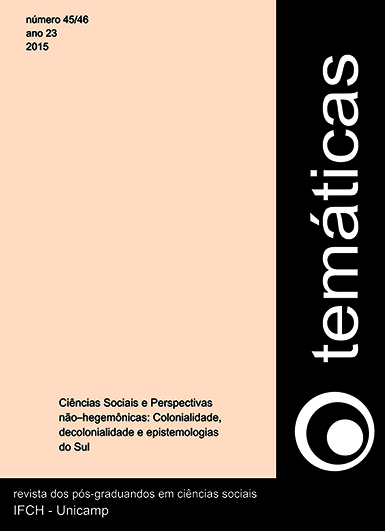Abstract
We seek to present theoretical perspectives that compose or influenced the so-called post-colonial and decolonial studies. To this end, we started with Foucault, which made it possible to perceive the power interspersed with micro-relationships, with an emphasis on the disciplining of bodies and the creation of subliminal rules of conduct. We then went through Derrida and Hall to mark the postmodern and post-structuralist influences on epistemological decolonization. By bringing the debate to the voices silenced by the colonial difference - the antithesis of différance - we observe the benefit of the inter-place expression of the Brazilian Santiago and the Indian Bhabha, as a possible synonym of hybridity, transit, frontier, from which identities are displaced and reinvented. We add the Latin Americans of the modernity-coloniality group, Quijano and Maldonado-Torres, in order to expose the existing types of coloniality and the need to think of their own epistemologies that can overcome them, such as Spivak's (2010) decolonial feminism, Lerma (2014) and Lugones (2011). We conclude that there is relevance in the concerns about the persistent colonialities of power, knowledge and being, and we call attention to the need for deconstruction as a method of understanding realities and discourses about realities in order to conceive a more effective intellectual criticism of production and reproduction of subalternities.
References
ALMEIDA, Júlia. Perspectivas pós-coloniais em diálogos. In: ALMEIDA, Júlia, MIGLIEVICH-RIBEIRO, Adelia, GOMES, Heloisa Toller (Orgs.). Crítica pós-colonial: panorama de leituras contemporâneas. 1. ed. Rio de Janeiro: 7Letras, 2013.
ALMEIDA, Júlia, MIGLIEVICH-RIBEIRO, Adelia, GOMES, Heloisa Toller (Orgs.). Crítica pós-colonial: panorama de leituras contemporâneas. 1. ed. Rio de Janeiro: 7Letras, 2013.
BALLESTRIN, Luciana. América Latina e o giro decolonial.Revista Brasileira de Ciência Política, n. 11. Brasília, maio – agosto de 2013, pp. 89-117. Disponível em: http://www.scielo.br/scielo.php?pid=S0103-33522013000200004&script=sci_arttext. Acesso: 28 de nov. 2015.
BONNICI, Thomas. O pós-colonialismo e a literatura: estratégias de leitura. 2. Ed. Maringá: Eduem, 2012.
BONNICI, Thomas.Conceitos-chave da Teoria Pós-Colonial. Maringá: Eduem, 2005.
COSTA, Sérgio. Desprovincializando a Sociologia – A contribuição pós-colonial. Revista Brasileira de Ciências Sociais – VOL. 21 n. 60. Disponível em: http://www.scielo.br/pdf/rbcsoc/v21n60/29764.pdf. Acesso: 28 de nov. 2015.
DERRIDA, Jacques. Margens da filosofia. Campinas, SP: Papirus, 1991.
FOUCAULT, Michel. Vigiar e punir : nascimento da prisão. 35 ed. Rio de Janeiro: Vozes, 2008.
FOUCAULT, Michel. Microfísica do Poder. Rio de Janeiro: Edições Graal, 1979.
HALL, Stuart. A identidade cultural na pós-moderrnidade. Rio de Janeiro: Lamparina, 2014.
LERMA, Betty Ruth Lozano. El feminismo no puede ser uno porque las mujeres somos diversas. Aportes a um feminismo negro decolonial desde la experiencia de las mujeres negras del Pacífico colombiano. La manzana de la discórdia. Julio-Diciembre, año 2010, vol. 5, n. 2:7-24. Disponível em: http://manzanadiscordia.univalle.edu.co/volumenes/articulos/Vol5N2/art1.pdf. Acesso: 20/07/2014.
LUGONES, María. Hacia un feminismo descolonial. La manzana de la discordia, Julio – Diciembre, Año 2011, Vol. 6, No. 2: 105-119. Disponível em: http://manzanadiscordia.univalle.edu.co/volumenes/articulos/V6N2/art10.pdf. Acesso em: junho/2014.
MALDONADO-TORRES, Nelson. A topologia do ser e a geopolítica do conhecimento. Modernidade, Império e Colonialidade. In: SANTOS, Boaventura de Sousa, MENESES, Maria Paula (Orgs.). Epistemologias do Sul [livro eletrônico]. São Paulo: Cortez, 2013.
MIGLIEVICH-RIBEIRO, Adelia M.. Intelectuais, Diáspora e Cultura: por uma crítica antimoderna e pós-colonial. Mouseion, n. 12, mai-ago/2012, pp. 44-55. ISSN 198-7207. Disponível em: http://www.revistas.unilasalle.edu.br/index.php/Mouseion/article/viewFile/402/408. Acesso em: junho de 2014.
MIGLIEVICH-RIBEIRO, Adelia M.. Subalterna e heroínas. Mulheres em guerra nos séculos XVIII e XIX: por um feminismo decolonial. In: GARDIA, Sara Beatriz (Ed.). Las mujeres em los processos de independência de América Latina. Lima-Peru, CEMHAL-Biblos, 2014.
QUIJANO, Aníbal. Colonialidade do poder e classificação social. In: SANTOS, Boaventura de Sousa, MENESES, Maria Paula (Orgs.). Epistemologias do Sul [livro eletrônico]. São Paulo: Cortez, 2013.
SANTIAGO, Silviano. Uma literatura nos trópicos: ensaios sobre dependência cultural. São Paulo: Perspectiva: Secretaria da Cultura, Ciência e Tecnologia do Estado de São Paulo, 1978.
SANTIAGO, Silviano. As raízes e o labirinto da América Latina. Rio de Janeiro: Rocco, 2006.
SPIVAK, Gayatri Chakravorty. Pode o Subalterno falar? Belo Horizonte: Editora UFMG, 2010.

This work is licensed under a Creative Commons Attribution-NonCommercial-ShareAlike 4.0 International License.
Copyright (c) 2015 Adelia Miglievich Ribeiro, Lílian Lima Gonçalves dos Prazeres

